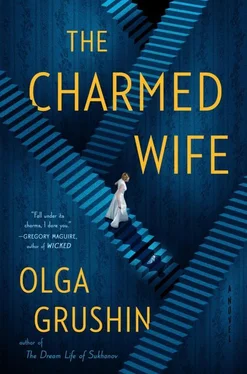This was, of course, pleasant and proper, and she felt that she was one of them, that she belonged. During the day she stayed busy being happy, and when she slept, she had no dreams but saw a sheet of solid blue instead, spreading on the underside of her eyelids, flooding her mind with peace. The prince—he was called Roland, though she had not thought to inquire after the name before sliding her little hand in his, looking deep into his cornflower-blue eyes, and whispering, “I do”—was all a prince should be, gorgeous and courteous, and he adored her. He threw balls in her honor, serenaded her with the finest musicians, showered her with sweet-voiced songbirds, soft-pawed puppies, and other tokens of princely fondness, whose very uselessness demonstrated the full extent of his devotion. If they did not finish each other’s sentences, it was only because they were not in the habit of holding protracted conversations: true sentiment had no need of verbal expression. Her love for him was all flowers, and waltzes, and a great sense of relief at things having worked out just so. And just so, they lived happily ever after, for one whole year.
By the end of that year of bliss, she was with child.
• • •
A sudden white flash rends the night over the crossroads, and I close my eyes, thinking it another bolt of lightning. Then I smell lavender soap, and my spirits sink, for I know just what—just who—it is.
“Well, look what the cat’s dragged in,” the witch says darkly.
I open my eyes to find my fairy godmother bearing down upon me, wringing her hands, smothering me in her laundered pink robes and fresh lilac smells, almost knocking me off my feet as she slams into me with the full impact of her unwavering goodness. I have never seen her apple-cheeked, double-chinned face look so distraught.
“My child, my dearest child,” she wails, “what are you doing here with this villainous wretch? Oh horror, what horror! Thank heavens I’ve arrived in time to save you from making the greatest mistake of your life!”
The witch spits at the fairy godmother’s feet.
“You can’t stop her, you know. Rules are rules. It’s her spell, and she is the only one who can end it. Madam, do you wish to continue?”
“She wishes nothing of the sort!” My godmother shakes me, none too gently. The top of her agitated, bobbing head barely reaches my shoulder. “You don’t know my darling like I do, drastic change will never make her happy. She just needs a good cry, that’s all, a good cry, a lovely cup of tea, a cuddle with her pillow, and things are bound to feel better in the morning. Let’s take you home without delay, my precious child, you’ll catch your death out here, in the cold and the damp, what with your delicate health. Come along now, there’s my girl.” She steps back to give me a sweet, encouraging, anxious smile. “My finest accomplishment.”
Her slightly protruding eyes are round, white, and moistly gleaming, like two peeled hard-boiled eggs, and I see myself reflected in them, a fragile ornament that has somehow rolled out of the box and needs to be repackaged with care in its soft, padded nest, where it will keep safe and untouched, asleep for a hundred years.
Anger scalds my insides. I twist away from her.
“I want him dead,” I say through gritted teeth.
The witch looks grimly triumphant.
“And I want him dead now . Do we really have to dole out the hairs one by one, or can I drop the whole bunch in at once and just be done with it?”
The witch ponders. Both of us pointedly ignore the fairy godmother’s gasps.
“I don’t see why not,” the witch announces at last. “Of course, traditions are, well, traditional, but allowances can always be made for exceptions. Go right ahead, it will be sprightlier this way.”
My heart takes off in a gallop—almost there, almost free… I step up to the cauldron; the two women follow. As I bend over the brew, I see the shuddering reflections of our three faces in the tumultuous mirror—a hag, a matron, a beautiful girl (who, quite true, is no longer a girl and whose beauty has dimmed, grown saggy here, tight there, yet who can still pass for one in the black of night, in the turmoil of magic, if no one inspects her too closely). I look from the florid double chin on my left to the warty chin sprouting wiry tufts on my right—my future laid out with such cruel clarity before me—and, newly hardened in my resolve, pinch the sorry bundle of my imminently late husband’s hairs in my fingers, and raise my hand.
And then, just as I am about to let go, the fairy godmother lurches forward with a stifled cry and makes a grab for me, her plump grip unexpectedly strong. The arc of my gesture goes awry. Only two or three hairs flutter, ineffectually, down into the potion, while the rest remain plastered over my fingers.
“You… you meddlesome witch !” cries the witch, as our struggling reflections in the cauldron give way to the vision of the royal palace.
She was wan and unwell all through the spring, and the prince was obliged to attend a dozen state balls and dinners by himself. She could not help feeling that she had let him down somehow, but he was full of understanding and begged her not to worry, not even when some urgent matters of foreign diplomacy forced him to travel to a distant southern province without her. To prove that she was ever in his thoughts, he had his fastest courier (the very one, in fact, who had brought the glass slipper to her stepmother’s house the previous year) shuttle between them, delivering immense gift baskets of star-shaped purple fruit ripened by the southern sun. It was lovely of the prince to think of her so often on his grueling travels, and she always rewarded the young courier with a grateful smile.
With the advent of summer, her sickness passed, and she began to swell. The prince was more solicitous still upon his return. He had moved his own bed to his study in the west wing to ensure her proper rest, her situation being delicate, but the regular tokens of love that he sent with the servants demonstrated his unfailing devotion. (She did not, in truth, feel especially delicate, but did not dare contradict the royal physician; she felt fortunate to be in his care.) The gifts themselves grew practical in nature, more suitable to an expectant mother: a pair of thick socks to be worn in bed; a book of recipes titled Mommy, Is Dinner Ready Yet? A Guide to Easy and Nutritious Cooking with Children ; a set of knitting needles, along with a basket of yarn enchanted to never run out. The knitting needles in particular offered hours of useful distraction, and she felt ever so appreciative as she whiled away her tranquil days making sweaters for old King Roland, chatting with her trusty mouse friends, Brie and Nibbles, and daydreaming of the prince’s next visit.
(Incidentally, Nibbles was courting Brie now, for Brie’s personal charms had come into much greater clarity once she had ornamented her whiskers with golden foil. Brie, however, felt rather torn, for she had met Falstaff, the pet mouse of the Marquise de Fatouffle. Unlike Nibbles, who was an ordinary brownish gray, Falstaff was perfectly white, and the insides of his ears glowed delicate pink, which Brie admired greatly. Too, Falstaff was exquisitely polite and lived in a beautiful cardboard mansion furnished with the softest little sofas and the loveliest little rugs, which he had inherited from a broken porcelain doll of the marquise’s youngest daughter. On the other hand, Brie had known Nibbles her entire life, and his cheese jokes and tummy rumbles made her giggle. For a time, distraught, she took to wandering alone in the garden, plucking daisies the size of her head, tearing off petals and muttering, “Falstaff—Nibbles—Falstaff—Nibbles,” into the spring breeze. When the gardener’s dog jumped out at her from behind the statue of a one-eyed queen, Brie only just made her escape, with a petal still crumpled between her paws and Falstaff’s name on her lips.
Читать дальше












